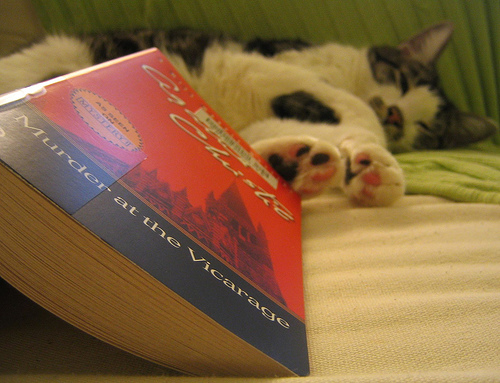6 Common Myths About Book Reviews
Today’s guest post is by Dana Lynn Smith, whose blog The Savvy Book Marketer helps authors and indie publishers learn how to sell more books. She shares some great insights about book reviews and dispels some myths that you may have heard and wondered if they are true.
Book reviews are a powerful promotional tool, but there are some misconceptions about how to obtain them. Here are some common myths about getting book reviews.
- Myth #1 – Book reviews are just for new books.
It’s true that book review journals read by librarians and booksellers review books at or soon after publication. It’s best to focus your review efforts during the first year of a book’s life, but some venues will review older books.
- Myth #2 – No one will review a self-published book.
It is more challenging for self-published authors and small presses to get reviews in certain venues, but it’s certainly not impossible. Self-published books are far more likely to be reviewed if they are produced to industry standards (well written, edited and designed). A number of book review websites welcome self-published books or even focus specifically on them, and there are several book journals like Midwest Book Review that are friendly to independent and small presses.
- Myth #3 – Book reviews are just for books being sold to bookstores and libraries.
Trade journals like Publishers Weekly and Library Journal are designed to meet the needs of booksellers and librarians, so they focus on books that are available through major distributors and wholesalers at standard discounts. But there are plenty of other places to get book reviews, including book blogs, topical blogs, online bookstores, specialty publications, literary magazines, and reader networks.
- Myth #4 – You can’t get reviews for ebooks.
It takes some extra research to identify revenue venues that will review books that are available only in ebook format. Many reviewers accept only printed books, although that is slowly changing as the use of ebook readers becomes more widespread. There are several websites, such as Kindle Obsessed, that focus on ebooks.
- Myth #5 – No one pays attention to the reviews in online bookstores.
It’s true that some shoppers view online reviews with skepticism, but I do believe that reviews (or lack of them) influence shoppers in online bookstores. In my book, How to Get Your Book Reviewed, I cite a research study by the Yale School of Management that backs this up. With so many books to choose from, shoppers are often looking for some factor to help them decide between several books.
Having very few or no reviews on an Amazon sales page can give the impression that the book isn’t very popular. Reviews can also give the shopper more insight into the book, beyond the product description.
Be sure to encourage customers and book reviewers to post their review or recommendation on Amazon.
- Myth #6 – It’s not worth the effort of pursing reviews.
Book reviews serve two basic purposes: they bring your book to the attention of people who might not have learned about it otherwise, and they help potential customers decide if your book is a good fit for them. The more reviews you have, and the more places those reviews appear, the greater your reach and your selling power.
All book marketing plans should include a strategy for maximizing the value of reviews, endorsements and testimonials.
 Dana Lynn Smith, The Savvy Book Marketer, helps authors and indie publishers learn how to sell more books through her how-to guides, blog, newsletter, and private coaching. Learn how to use reviews to sell more books in her comprehensive guide, How to Get Your Book Reviewed, and get more book marketing tips at her blog here.
Dana Lynn Smith, The Savvy Book Marketer, helps authors and indie publishers learn how to sell more books through her how-to guides, blog, newsletter, and private coaching. Learn how to use reviews to sell more books in her comprehensive guide, How to Get Your Book Reviewed, and get more book marketing tips at her blog here.












I would like to highlight Myth #4. Whenever I am looking for a genre-specific books, it’s always one of my requirements that books should have reviews. In this way, I can have a glimpse of what the book is all about before buying it.
Some people may be skeptic about book reviews on online bookstores but for people like me who want to make sure that we get the right book that we want and not wasting a cent for any misleading books, book reviews is a great help!
I would like to highlight Myth #4. Whenever I am looking for a genre-specific books, it’s always one of my requirements that books should have reviews. In this way, I can have a glimpse of what the book is all about before buying it.
Some people may be skeptic about book reviews on online bookstores but for people like me who want to make sure that we get the right book that we want and not wasting a cent for any misleading books, book reviews is such a great help!
sorry, it should be Myth #5 – No one pays attention to the reviews in online bookstores and not Myth #4. 🙂
Thanks for your note. There’s a lot of talk these days about “fake” reviews posted on online bookstores, but I think most readers realize that most reviews on the bookstores are legitimate and they appreciate getting some insight into books before they buy.
Susanne, thanks for sharing my article with your readers. Authors, I encourage you to pursue reviews from a variety of sources throughout the life of your book!
Good post. As an author, I know book reviews matter. The more reviews on Amazon, the more likely ebook reviewers and bloggers will pick you up. The more reviews on Goodreads, the more likely readers are to pick you up.
As a reader, book reviews matter. At least to me. Rightly or wrongly, lots of reviews signal credibility. I read from reviews from the highs and lows to see what other readers liked and what caused them anxiety.
Carol, thanks for mentioning Goodreads – it’s an important source of reviews and sharing about books. I encourage all authors who publish printed books to look into the book giveaway programs at Goodreads and LibraryThing.
Thanks for the great insights, Dana. I went with Reader Views, who gave me a strong review. I also chose the Midwest Book Review, The Book Reporter, and The Kindle Book Review (who does review ebooks). I also sent mine to the Alabama Writers’ Forum, since my book has a regional flavor.
I’m combining reviews with book signings, getting the book into a local independent book store on consignment (harder than it sounds), donating a few to local libraries. I saw that a nearby antique store was selling local author books on consignment, and they agreed to carry mine. One of those authors was selling hers in comb-bound (printed at Office Max) manuscript form. I did a PRWeb press release that went national. I did a book reading at a local military school, which opened the doors with the librarian, who wants to get a press release with photos of me donating my book. And she will work to get it into library catalogs (another tough nut to crack for a self-published author).
I didn’t know that Library Journal much prefers to review 3-6 months -before- publication, but you can still submit directly to the appropriate columnist. They make no guarantee that the book you submit will be reviewed at all, but if it is, librarians everywhere will see it.
Here is an article from The Creative Penn I found very helpful:
odOI4HSeZWM2
Regards,
Clarence Bonner
Author of “I Talk Slower Than I Think: An Antidote to Helicopter Parenting”
Sorry, here is the link to The Creative Penn article by
Joanna Penn I mentioned:
http://www.thecreativepenn.com/2012/03/28/get-book-reviews/
As an author, I LOVE reviews–even the bad ones. They are important. ;o)
But as a reader, I seldom read reviews until after I’ve read the book. I behave the same online as I would in a library or bookstore: if cover & title capture my attention, I read the blurb. If I like the blurb, I’ll either read the first few pages or download a free sample. If I like the first few pages/free sample then I will buy the book.
I have friends who won’t read a book until they’ve read most of the reviews. I don’t like doing that because I am of the mindset that one man’s junk is another’s treasure.
With that said, I do agree with all of your points. ;o) Great article.
Suzan Tisdale
Thanks for your note Suzan. A few more points about how consumers view reviews: Some readers are reluctant to buy books with no reviews – in their minds no reviews means the book isn’t very popular. Some people don’t like to read fiction reviews because they don’t want too much of the story given away in advance. Also, most people realize that fiction is quite subjective so I think they take a range of good/bad reviews with a grain of salt. As a reader, I find nonfiction, reviews are really helpful in comparing several books on the same topic.
I always read customer reviews on Amazon before buying a book by an author new to me. A lot of negative reviews send up a red flag, especially if the customer is specific about holes in the plot or too many typos to be readable. If a lot of people are complaining about the same thing there’s probably some merit there. I’m an indie author myself, but I admit there’s a lot of garbage to sort through these days.
I’m more interested in the cover, blurb and sample than the reviews. I do look at the one-stars to see if they mention typos and obvious editing errors. However most reviews these days are a statement of opinion. I don’t like reading positive reviews because they may give away too much of the plot. Negative reviews are helpful because it actually makes me more interested to see if I might like what the reviewer hated. But at the end, I really make my own judgment by downloading a sample and reading it. Unless the price is right, then I download [based on cover, blurb, genre] and ask questions later.
It’s interesting that most of the comments on this post have focused on how authors feel about reading reviews in online bookstores. Just a reminder – one of the main benefits of reviews is to get your book noticed by people who might not have heard about it otherwise. Readers discover books by seeing reviews in book review blogs, topical blogs, and various types of publications.
Thanks for the reminders, especially the one that reviews are not just for recently released books.
Una Tiers
Una, that’s one of the biggest misconceptions that authors have. It’s important to seek reviews before and just after publication, but don’t give up if your book has been out for a while!
Reviews certainly influence me as a buyer/reader. That’s why I also take the time to review books I deem reader worthy.
I’m also someone who loves a good movie. I reviewed some choices just this evening and will watch the one tonight which got the highest reviews. Generally the crowd is a good one to follow when your spending time or money on something.
I will usually read reviews before buying online, but I’ll search for reviews that actually have something to say. Book blog reviews definitely influence me to look out for particular authors. As an author, I just wish I had more reviews so I could learn what people think of the book–or so I could believe I had more readers 🙂
Miss Smith:
Thanks for sharing this tidbit of information. I had never paid any attention to reviews prior to learning about them and their value. I know I have some good reads in the books I have already published but the route to getting the review has been so hard to follow that my friends who have read my books compliment them but don’t want the hassle of going through the process of getting to the review. I have 4 books published through Create Space publishers and subsequently made digital on Amazon. They have just sat there! I am among the thousands of mystery writers out there and somehow no one has gotten to them. Could you suggest a way for me to get more reviews…and maybe more sales there? I have had book signings, done well with them and sold a fair amount of books. I went through the educational part of learning my craft, the books have been well accepted by the very different group of people who have purchased them, so I know their readable!
Thanks again for your time in providing the blog.
James M. Copeland
Thanks for your note, James. One of the keys to getting readers to post reviews for you on sites like Amazon is to make it really easy for them. Briefly explain how valuable reviews are to both readers and authors, provide a direct link to the page where a review can be posted, and remind readers that reviews don’t need to be long.
There are a number of other places to get reviews. See this article for ideas:
http://www.30daybooks.com/7-ways-to-get-your-book-reviewed/
My book, How to Get Your Book Reviewed, includes detailed instructions for pursuing various types of reviews throughout the life cycle of a book. It’s available at http://www.GetBookReviews.net.
Don’t get discouraged – book marketing is a long-term process and sales build over time.
Hi, I’m another one of those silly people than think reviews mean something. I always read the reviews when I go to buy a book. The only time I don’t actually read the reviews is if there are a hundred or so then I look at the stars and see what the averages are.
I usually ignore the stars because people like and dislike the same thing for a countless number of reasons. If the story line sounds interesting, I look at the reviews and then may or may not buy the book. Another thing that is becoming more important is reading the front section as provided in the “Take a Look Inside” Amazon.com now uses.
I really detest the reviews where the reviewer just says they didn’t like the book…That’s not a review, that’s a judgement. When I read a review I want to know why you didn’t like the book or why you thought it was great. “I just loved the book and you will too,” is as bad as the previously mentioned blurb.
Duke
I’m one of those who thinks reviews are extremely important. I’m in the process of designing my first novel for release, and the thought of not getting the right reviews terrifies me. I’m afraid I can do all the right things: right a compelling story, have good editors, a great cover design, and still struggle to get noticed. In the end, and in the words of the Amazon CEO on the Today Show this morning, “Be willing to try new things; be willing to fail” in order to find success. So… we’ll see. 🙂
Great article!!
Encouraging article, thanks Dana. Is it possible to get some more details? For example:
– What venues publish reviews of existing books? How old can the books be?
– Where can I find out which book review websites welcome self-published books?
Thanks!
Thanks for sharing such a great post. As a new, indie author I see the pros and cons of reviews. As a reader, I never read reviews. As an author, I am skeptical when I see a book with thirty Five Star Reviews yet the book is ranked at 14 million on Amazon. When you ask someone to review your book, do you give them a synopsis? Do you explain the book first? Thank again.
I don’t give anyone anything in order to review my book. I do send out ARCs (advance reader copies, which are galleys or uncorrected proofs) of my print books so reviewers can get them in advance of the release date. Those are accompanied by a PR letter telling about the book briefly and the series, along with a short bio. If you are sending out copies to reviewers, including a press release or PR letter is a good idea.
Great article,
for many people reviews are the main selling point not just for e-books, but books, movies, programs etc
For the self publisher, initially the main aim is to get the book out there, which is only the very first phase, there is then a lot of work that needs to be done in order to make sales. Reviews are good for many buyers, however for the weir mutants like my self, I personally pay little attention to reviews, as what someone may think is good is not necessarily, my opinion.
I feel that for the self-publisher, much work, has still yet to be done, you may be a great writer but a poor marketer, and it is in this area, that will ultimately make sales. Naturally good reviews can help, although I am with Hunter S Jones on this respect.
I guess the hard part is finding and pitching to these reviewers. How many reviews should I aim for?
SCRhyne
I’m not sure there’s a magic number, but you can always keep reaching out to book reviewers and get more reviews.